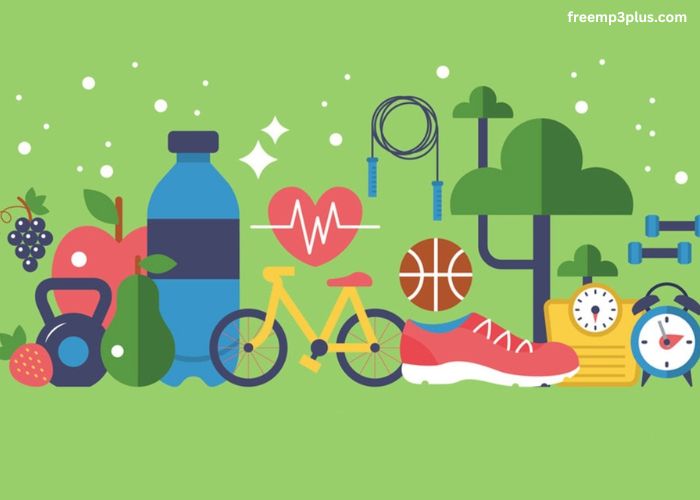Introduction
Maintaining a healthy lifestyle is crucial for overall well-being. It not only enhances physical health but also contributes to mental and emotional stability. In today’s fast-paced world, prioritizing a balanced life can be challenging, but by incorporating simple yet effective habits, individuals can achieve a healthier and more fulfilling life. This article explores key healthy lifestyle habits that promote balance and well-being.
1. The Importance of a Healthy Lifestyle
A balanced life ensures optimal physical and mental health, improving longevity and overall quality of life. Living healthily means making conscious choices about diet, exercise, sleep, and stress management. The benefits include improved energy levels, enhanced mood, better weight management, and reduced risk of chronic diseases like diabetes, heart disease, and obesity.
2. Nutrition: The Foundation of Health
2.1. Eat a Balanced Diet
A well-balanced diet provides essential nutrients for the body’s proper functioning. Key components of a nutritious diet include:
- Fruits and Vegetables: Rich in vitamins, minerals, and antioxidants that support immune function.
- Lean Proteins: Essential for muscle repair and growth, found in foods like chicken, fish, beans, and nuts.
- Whole Grains: Provide fiber and energy, such as brown rice, whole wheat, and quinoa.
- Healthy Fats: Found in nuts, seeds, olive oil, and fatty fish, which support brain and heart health.
2.2. Stay Hydrated
Drinking sufficient water is vital for digestion, circulation, and temperature regulation. Experts recommend consuming at least 8 glasses of water daily to maintain hydration levels.
2.3. Limit Processed Foods
Processed and fast foods contain high levels of sugar, unhealthy fats, and preservatives that can lead to weight gain and other health issues. Opt for natural, whole foods to sustain energy and improve overall health.
3. Regular Physical Activity
3.1. The Benefits of Exercise
Engaging in regular physical activity enhances cardiovascular health, strengthens muscles, and boosts mental well-being. Exercise also helps in weight management and reduces the risk of lifestyle diseases.
3.2. Types of Exercises for a Balanced Life
- Aerobic Exercises: Running, cycling, swimming, and brisk walking improve heart health.
- Strength Training: Weightlifting and resistance training enhance muscle strength and endurance.
- Flexibility Exercises: Yoga and stretching improve mobility and reduce the risk of injury.
- Mind-Body Activities: Tai Chi and meditation enhance relaxation and mental clarity.
3.3. Incorporate Movement in Daily Life
For those with busy schedules, simple activities like taking the stairs, walking during breaks, and engaging in household chores contribute to physical well-being.
4. Quality Sleep for Better Health
4.1. Why Sleep is Essential
Adequate sleep supports cognitive function, emotional well-being, and physical recovery. Adults should aim for 7-9 hours of sleep per night for optimal health.
4.2. Tips for Better Sleep
- Maintain a Sleep Routine: Go to bed and wake up at the same time daily.
- Create a Relaxing Environment: Keep the bedroom dark, cool, and quiet.
- Avoid Screens Before Bed: The blue light from devices disrupts melatonin production.
- Limit Caffeine and Alcohol: These can interfere with sleep quality.
5. Stress Management and Mental Well-being
5.1. The Impact of Stress on Health
Chronic stress contributes to anxiety, depression, and physical ailments. Managing stress effectively leads to a more balanced and healthier life.
5.2. Strategies to Reduce Stress
- Practice Mindfulness and Meditation: Helps in maintaining emotional stability.
- Engage in Hobbies: Activities like painting, reading, and gardening reduce stress.
- Socialize and Stay Connected: Healthy relationships enhance emotional well-being.
- Deep Breathing Exercises: Helps in calming the nervous system.
6. Avoid Harmful Habits
6.1. Limit Alcohol Consumption
Excessive alcohol intake can lead to liver disease, heart problems, and addiction. but recovery is always possible with professional support from facilities like Carrara luxury rehab center that provide comprehensive care. Moderate consumption is key to maintaining balance.
6.2. Quit Smoking
Smoking is linked to numerous health risks, including lung disease and heart issues. Seeking professional help and support groups can aid in quitting.
7. Maintain a Positive Mindset
7.1. The Power of Positive Thinking
A positive mindset improves resilience, reduces stress, and enhances overall well-being. Practicing gratitude and focusing on solutions rather than problems fosters a healthier outlook on life.
7.2. Self-Care Practices
- Journaling: Writing down thoughts and goals improves clarity and focus.
- Practicing Gratitude: Focusing on blessings increases happiness.
- Spending Time in Nature: Helps in relaxation and rejuvenation.
8. Work-Life Balance
8.1. Importance of Work-Life Harmony
Maintaining a balance between work and personal life prevents burnout and enhances overall happiness.
8.2. Tips to Achieve Work-Life Balance
- Set Boundaries: Keep work and personal life separate.
- Prioritize Tasks: Focus on important and urgent tasks first.
- Take Breaks: Short breaks improve productivity and mental clarity.
9. Routine Health Checkups
9.1. The Significance of Medical Checkups
Regular health screenings detect potential health issues early, allowing for timely intervention. Common tests include blood pressure monitoring, cholesterol checks, and diabetes screening.
9.2. Dental and Eye Care
Oral and vision health are essential for overall well-being. Regular dental checkups and eye exams help in maintaining good health.
Conclusion
A balanced life is achieved by adopting healthy lifestyle habits. From proper nutrition and regular exercise to quality sleep and stress management, every aspect plays a role in overall well-being. Making small yet meaningful changes leads to long-term health benefits, ensuring a fulfilling and vibrant life. Prioritizing self-care and mindfulness contributes to a holistic approach to health, allowing individuals to lead happier and more productive lives.
